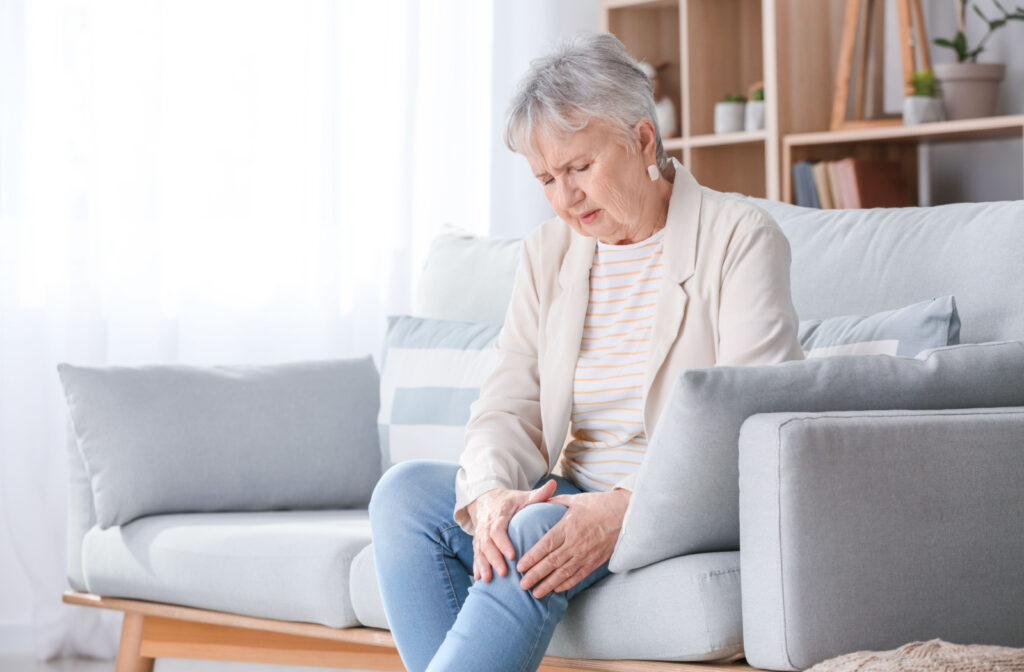Activities of daily living (ADLs) are essential tasks that many people do every day for their own well-being, such as bathing, dressing, and eating, as well as more complex tasks like managing medication, running errands, and participating in social activities. For seniors affected by chronic pain, there can be significant challenges related to activities of daily living.
Chronic pain and fatigue can make it much more challenging to perform many activities of daily living that require physical or mental exertion, such as standing, walking, or reaching. Additionally, chronic pain may cause some people to experience depression, anxiety, and other changes to their mental health that can further affect their ability to perform ADLs.
What Are Activities of Daily Living (ADLs)?
ADLs are the tasks we complete daily that play a significant role in our lives. These essential activities help us maintain a sense of control and dignity and include activities like bathing, cooking, and cleaning.
Completing ADLs helps people to maintain their independence, quality of life, personal hygiene, health, and finances. Those affected by challenges related to aging may find it difficult to perform ADLs on their own—but support for daily living can change that.
Some of the activities of daily living that seniors and others may need support for include the following:
- Moving around
- Bathing
- Eating and cooking
- Dressing
- Daily transportation
- Managing finances
- Cleaning
- Managing medication
Understanding Chronic Pain
Chronic pain is a type of persistent pain that lasts longer than 3 months and can be caused by a variety of factors. Unlike acute pain, which is typically a sign of immediate injury or illness, chronic pain can persist for months or even years and can be debilitating to those who suffer from it.
Some of the most common causes of chronic pain include conditions like arthritis, fibromyalgia, back pain, and migraines. These conditions have several causes, including injury, illness, or genetics, and can be challenging to manage. Chronic pain can also be caused by lifestyle factors such as a poor diet, lack of exercise, or high levels of stress.
Chronic pain can have a significant impact on daily life and overall well-being, making it difficult to function and perform everyday activities because of several effects.
Impact of Chronic Pain on ADLs
There are several ways chronic pain can make it more difficult to complete activities of daily living. Some of the challenges those affected by chronic pain may experience include:
- Mobility challenges
- Personal hygiene and grooming challenges
- Eating, cooking, and nutrition challenges
- Disrupted sleep
- Effects on mental health
Mobility Challenges
Chronic pain can reduce an individual’s mobility and affect their ability to walk or climb stairs.
Pain can cause stiffness, discomfort, and reduced range of motion, making it difficult to stay active. In turn, those mobility challenges may lead to a sedentary lifestyle, which can further aggravate pain and lead to a range of other health issues.
Personal Hygiene & Grooming Challenges
An individual with chronic pain may struggle with personal hygiene and grooming tasks. These activities require movement and range of motion, which can be uncomfortable and may exacerbate pain. Tasks such as showering, brushing teeth, or combing hair may become more challenging, leading to a decline in self-care and personal hygiene.
Eating, Cooking, & Nutrition Challenges
Chronic pain can also affect an individual’s eating, cooking, and nutritional habits. For example, standing for long periods to cook meals may be difficult, making it more challenging to prepare wholesome meals. In turn, this may result in an inadequate intake of essential nutrients, further compounding the negative effects of chronic pain.
Disrupted Sleep
Chronic pain can disrupt sleep patterns, leading to fatigue, irritability, and decreased quality of life. Sleep is essential for overall health and well-being, and those with chronic pain may find it harder to fall asleep or stay asleep, which can impact their daily routines.
Effects on Mental Health
The relationship between chronic pain and mental health can be complex. However, chronic pain is often associated with depression, anxiety, and stress, leading to feelings of isolation and helplessness. These emotional factors can make it challenging to engage in ADLs as well.
Nurturing your emotional well-being can be as essential as managing chronic pain. Strategies such as mindfulness, meditation, therapy, and support groups can help individuals manage the psychological impacts of chronic pain and maintain their mental health.
Tips for Managing Chronic Pain While Completing Daily Activities
Here are some practical tips and techniques to help those affected by chronic pain perform ADLs:
- Use assistive devices such as canes, walkers, or crutches for support during mobility tasks.
- Break up hygiene and grooming tasks into smaller, manageable chunks rather than completing them all at once.
- Simplify cooking tasks by using pre-cut ingredients or cooking with a slow cooker to minimize standing time.
- Make changes to your sleeping environment to improve comfort, such as using additional pillows or investing in a more supportive mattress.
Enhancing Senior Well-being at Parsons House Austin
Parsons House Austin is dedicated to providing compassionate care and personalized assistance for seniors and their families. Our community is founded on supportive, caring principles we’ve held close during our 40 years as a family-driven organization. We want to promote independence and help seniors live life to the fullest. Contact us today for more information on how we can support you or your loved one.


